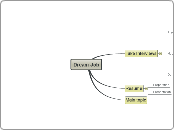Honest and Open vs. Closed and Opaque
say the necessary to create trust
expose by giving all your info.
Best Practices in Negotiation
Learn from the Experience
follow a three-step process
personal diary on strengths and weaknesses
work on your weaknesses
“take a lesson” from a trainer or coach
Plan a personal reflection time
to remain sharp
analyze after every negotiation
Remember rationality and fairness are relative
maintain high perceptions
illuminate definitions of fairness held by the other party
reach to a consensus in standard of fairness
find external benchmarks
suggest that have fair outcomes
question their own perceptions of fairness
clear principles
Savor and Protect your Reputation
work to shape and enhance reputation
being consistent and fair
"tough and underhanded"
verify what the other says, be vigilant for dirty tricks and be guarded of sharing info.
"tough but fair"
difficult negotiation, but rational and fair
essential to have a positive reputation
Actively Manage Coalitions
loose, undefined colaitions
coalitions that support you
communication is essential
coalitions against you
recognize them
divide and conquer
Remember the intangibles
Asking questions, analyzing their behaviors and taking and observer or listener to the negotiation
"see what is not there"
Master the Key Paradoxes of Negotiation
Trust vs. Distrust
level of trust is seen in the process
believe everything
Stick with the strategy vs. New options
distinguish a phantom (or trojan horse) opportunity
real opportunity
important to belive in your intuition
Principles vs. resilient to the flow
a flexible thinking and understanding when the situation changes
distinction between issues of principle
Claiming Value vs. Creating Value
integrative skills for value creation
balance the stages and their transitions
distributive skills for value claiming
Be Willing to Walk Away
there is a poor arrangement or if it's offensive
in mind the goal is to obtain a good outcome
make regular comparison with the target
maintain clear a walkaway point
Identify and Work the BATNA
option that will be chosen if the agreement isn't reached
a good BATNA you can find a good deal
notice the BATNA of the other part
monitor it carefully, show your BATNA is better and show competitors BATNA is weak.
Diagnose the Fundamental Structure
Negotiatiors
negotiations consist of a blend of integrative and distributive elements
in integrative and distributive phases
be careful in the transitioning
analyze what type of negotiation they are facing
choose strategies and tactics
acommodative, avoidance and compromise
Be prepared
Negotiators
replanning the negotiation sequence
overplanning tactics
Plan their statements and positions
recognize and prepare for the effects of the broader context
understanding one's own goals and interests
setting high but achievable aspirations
understand the others party communication
find an agreement
an ability to articulate them
more preparation
numerous advantages
the ability to analyze the others party's offer









